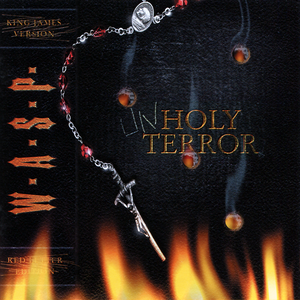Published on Apr 3, 2001
Blackie Lawless is known to be a songwriter of conviction.
Whether it has been dealing with the skeletons in his closet (
The Crimson Idol – note I’m not claiming it’s purely
autobiographical), sheer raw anger and emotion (
K.F.D.) or raising his middle finger towards what we’ve been
taught is “prim and proper”, Lawless and W.A.S.P. have remained one
of the most interesting bands in the metal genre to follow over the
years.
So when it was hinted that Lawless was going to take on
organized religion with the group’s latest disc,
Unholy Terror, I became nervously excited, wondering what
kind of a spin Lawless would put on his experiences. I’ve lived
with an advance copy of this disc for two months now, and I keep
coming back to the same conclusion: the controversy is much ado
about nothing.
Unholy Terror is not W.A.S.P.’s best album, though it is
enjoyable nonetheless.
If anything,
Unholy Terror is a tame album, at least in W.A.S.P.’s
standards. The two-song suite of “Unholy Terror” and “Charisma” are
the tracks that have the strongest ties to Lawless’s views on
religion – as well as the frightening power that certain
individuals in history have wielded over people. While there are a
few jabs taken at religion (namely the Vatican and “holy wars”),
Lawless seems to be warning people to guard themselves against the
evil that lies in the charming powers some groups possess. It’s
less blasphemous than it is thought-provoking, and is a
well-written piece of music that does rank with W.A.S.P.’s best
work.
Where the weakness on
Unholy Terror comes in is that these two songs are
sandwiched between some lesser tracks. “Let It Roar” opens with a
powerful enough guitar blast, but is noteworthy mostly due to the
absence of a true guitar solo. “Hate To Love Me” could well be
Lawless’s view of certain people, but just does not have the
conviction in the songwriting that so many of his compositions over
the years have. Likewise, “Who Slayed Baby Jane?” tries to go for
the shock value, but comes off sounding like an Alice Cooper
toss-away.
This isn’t to say that
Unholy Terror is a disc of castaway tracks. The instrumental
“Euphoria” dares to present a new side of W.A.S.P. to the fans –
namely, the chance to focus on the music without the wailing
guitars or Lawless’s instantly recognizable banshee scream. In
fact, this selection is quite enjoyable, proving there is true
musicianship behind the Marshall stacks. And if W.A.S.P. ever was
looking for another hit single, “Evermore” follows in the footsteps
of their previous charting song “Forever Free”. Borrowing a page
from Led Zeppelin’s “Thank You,” one almost expects Lawless to
break into a Robert Plant impression at times. Still, it’s an
enjoyable track.
Now that this album is out, you know that some pinhead is going
to blame the next school shooting on a song like “Loco-Motive Man,”
despite the fact that Lawless vehemently states in the liner notes
he’s against such acts of terror. Instead, Lawless tries to place
himself in the mind of one such individual, trying to discover just
what pushes someone over the edge and into the state of madness
that leads a person to commit such acts. He doesn’t quite hit the
mark with this one, but Lawless should be applauded for making the
effort and trying to wake people up to a problem that just didn’t
exist 20 to 30 years ago.
Unholy Terror occasionally disappoints, and always seems to
come up with something to redeem itself musically. Lawless and crew
should be proud of the strong selections on this disc, but they
should also be careful that they’re not letting their musical guard
down. It’s too easy to slip into a pattern of mediocrity, and one
can only hope the weak tracks on
Unholy Terror aren’t a sign of things to come.
